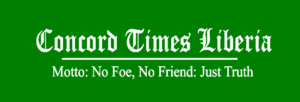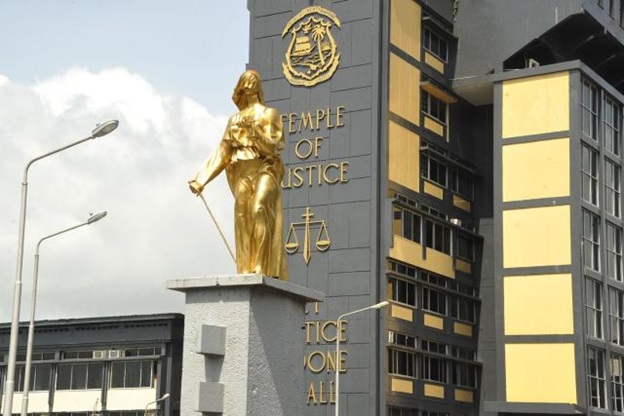In an escalating political crisis, the House of Representatives in Liberia finds itself sharply divided as a faction of lawmakers—allegedly backed by the ruling Unity Party—attempts to remove House Speaker Cllr. Fonati Koffa. This maneuver, widely viewed as unconstitutional, raises serious questions about the integrity of Liberia’s democratic processes and the rule of law.
Under the Liberian Constitution, the removal of the House Speaker requires a supermajority of 49 out of the 73 members of the House of Representatives. However, the current efforts to oust Koffa are being carried out through what many observers describe as unlawful tactics, undermining the constitutional framework designed to ensure fair governance.
The rift within the House of Representatives has deepened, fueled by political discontent and accusations of external interference. The disgruntled lawmakers, often referred to as the “rebel faction,” have been accused of operating under the influence of the Unity Party, which has been in power since the last elections. This alleged sponsorship raises concerns about the ruling party’s commitment to democratic principles and the maintenance of a balanced government.
Cllr. Jonathan Finati Koffa, a member of the opposition Congress for Democratic Change (CDC), has become a focal point in this political struggle, symbolizing the resistance against what many perceive as authoritarian overreach by the Unity Party. Supporters argue that Koffa’s leadership has been crucial in maintaining legislative integrity and accountability, and any attempt to remove him without adhering to constitutional guidelines poses a threat to Liberia’s nascent democracy.
The Supreme Court of Liberia has reserved its ruling in the case involving this contentious issue. The court is now faced with the challenge of interpreting the Constitution amidst a backdrop of political strife. As the High Court prepares to make a decision, pundits speculate whether the ruling will embolden the “majority bloc,” who argue that this case is inherently political and that the judiciary should refrain from interfering in legislative matters. Conversely, should the court uphold Koffa’s position, it would reinforce the principle of the “rule of law” and send a clear message that the days of “jungle justice” are over.
Legal experts and political analysts have voiced alarm over the potential implications of these actions. If the House of Representatives can be swayed by political maneuvering rather than constitutional mandates, it sets a dangerous precedent for governance in Liberia. Critics argue that such actions could lead to increased political instability and undermine public trust in elected officials.
As tensions rise, there are growing calls for unity and adherence to the rule of law among lawmakers. Civil society groups and opposition parties have mobilized to defend Koffa and advocate for constitutional processes, emphasizing the need for dialogue and compromise in resolving political disputes.
The situation remains volatile, with the potential for significant repercussions for Liberia’s political landscape. As the struggle for power continues within the House of Representatives, the nation watches closely, hoping for a resolution that honors the Constitution and upholds democratic values.
Rebel lawmakers have attempted to insinuate the “separation of powers doctrine” without realizing that there is no complete independence among the three branches of government. Many of these rebel and renegade lawmakers mistakenly believe that the three branches (executive, legislative, and judicial) operate entirely independently of one another. In reality, they are designed to work together and have overlapping powers that allow them to check and balance each other.
Some people think that each branch has absolute power in its own domain. However, the Constitution provides mechanisms for checks and balances that limit the powers of each branch, ensuring that no single branch can dominate the others.
A common misconception is that the separation of powers means that the branches cannot collaborate or communicate. In practice, cooperation is often necessary for governance, such as when the executive branch proposes legislation to the legislative branch.
Some even believe that judicial review—the power of courts to assess the constitutionality of legislative and executive actions—is outside the separation of powers framework. In fact, judicial review is a critical mechanism that allows the judiciary to check the other branches.
Many think that the President is completely separate from the legislative process. However, the President has the power to veto legislation, propose bills, and influence legislative priorities, making the executive branch an active participant in lawmaking.
While the legislative branch is often seen as the most powerful due to its lawmaking capabilities, the executive branch can exert significant influence, particularly in matters of foreign policy and national security.
Some individuals in Liberia, especially those supporting the rebel lawmakers, believe that the separation of powers is a fixed arrangement. In reality, it is a dynamic system that evolves through historical context, judicial rulings, and political practices.
Understanding these misconceptions can help clarify how the U.S. government operates and the importance of the checks and balances system in maintaining democratic governance.
The interpretation of the Constitution by the Supreme Court, as seen in the current crisis within the Liberian House of Representatives, can be viewed from multiple angles. Generally, the Supreme Court’s role is to interpret the Constitution and resolve disputes that arise under it, which may include conflicts involving legislative bodies.
Whether this is seen as interference or a necessary function often depends on the political context and the perspectives of the different branches of government. Critics may argue that judicial intervention in legislative matters undermines the separation of powers, while proponents may assert that such intervention is essential for upholding constitutional principles and protecting rights.
One notable example is the Supreme Court case United States v. Nixon (1974). This case arose during the Watergate scandal when President Nixon refused to release tape recordings and other documents, claiming executive privilege. The Court ruled that the President was not above the law and ordered the release of the tapes. This decision was significant because it reinforced the principle that no one, including the President, is above the Constitution and effectively curtailed executive power during a legislative crisis.
Another example is Bush v. Gore (2000), where the Supreme Court intervened in the Florida vote recount during the presidential election. The Court’s decision effectively resolved the election dispute, which some viewed as judicial interference in a political process, while others saw it as a necessary intervention to ensure electoral integrity.
These instances illustrate the balance the Supreme Court attempts to maintain between interpreting the Constitution and respecting the roles of the legislative and executive branches.
The Liberian judiciary has faced criticism for corruption and other malfeasance; this is the time for the Supreme Court to redeem its image. The nation and its people stand at a critical juncture in history as the High Court holds the responsibility to uphold the rule of law.
In a country still recovering from years of civil conflict, the stakes are high. The path forward will require all stakeholders to commit to constitutional governance and the principles of democracy, ensuring that Liberia does not repeat the mistakes of its past. As the Supreme Court deliberates, the outcome could very well define the future of Liberia’s political integrity and the strength of its institutions.








